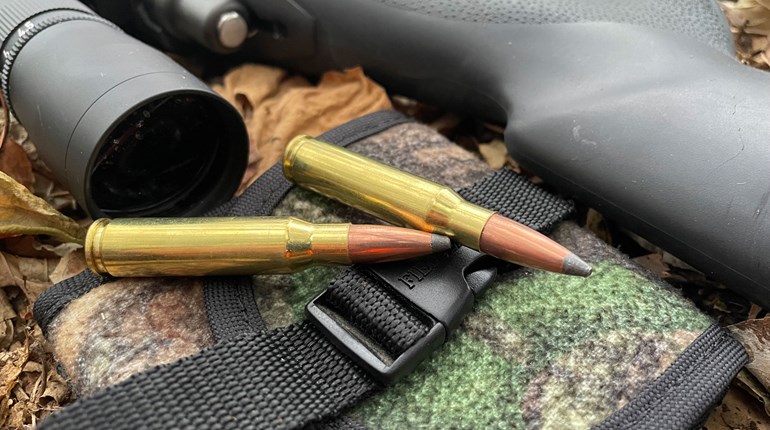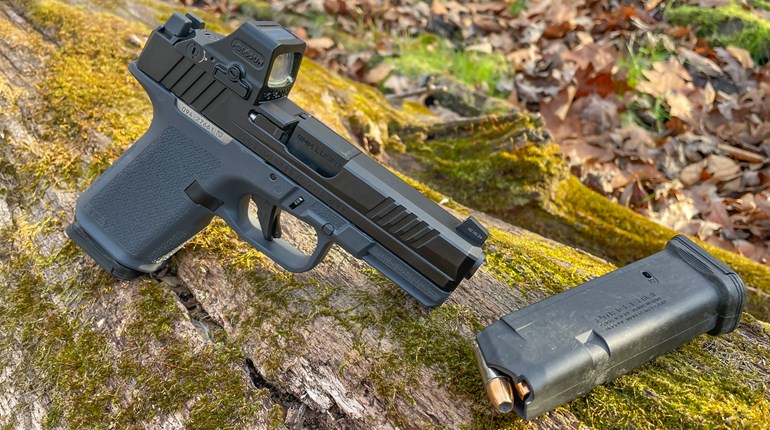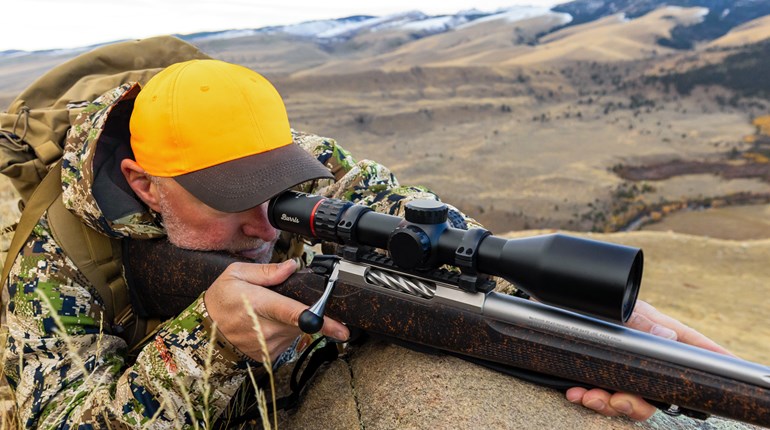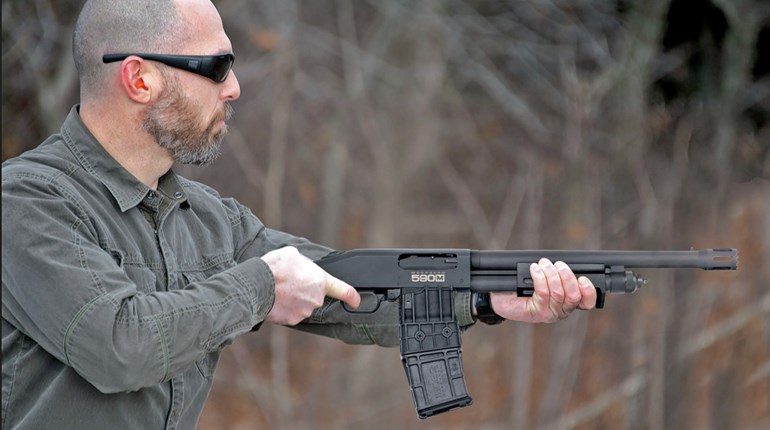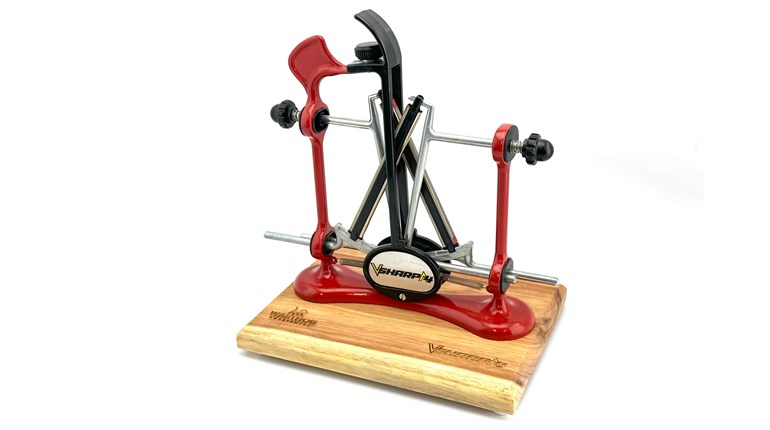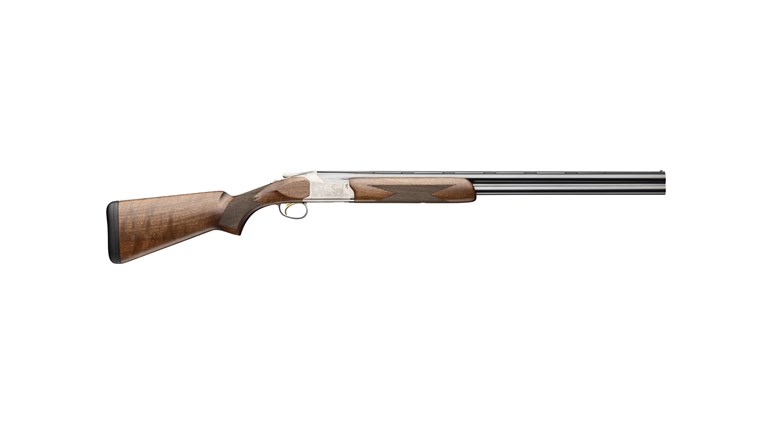
“Shoot from the hip” and “stick to your guns” are two prevalent idioms that happen to have firearm terminology. However, one that’s especially fitting for Ceska zbrojovka Uhersky Brod (CZ) is “third time’s the charm.” Why? Unveiled in 2009, the CZ EVO 3 A1 was the third (hence the name, “Evolution [EVO] 3”) and best incarnation of the selective-fire, blowback-operated, Scorpion-series submachine guns that originated as the brainchild of Ing. Miroslav Rybar (and upward of 13 other designers): the Samopal vzor 61, better known as the Skorpion vz. 61.
 The Scorpion EVO 3 A1
The Scorpion EVO 3 A1
Unveiled for the first time in May 2009, the selective-fire Scorpion EVO 3 A1 represented a true departure from normalcy for CZ. In fact, the new submachine gun outwardly showed no resemblance to either the XCZ 868 prototype or its first- and second-generation predecessors. First, the new arm makes extensive use of polymer. For example, the two-halved receiver, handguard, adjustable (for reach) pistol grip and removable, adjustable side-folding buttstock, as well as the magazine were all made from polymer. When combined, the fiber-reinforced polymer receiver and handguard provided 11 inches of continuous Picatinny rail to which optics can be attached, though adjustable, factory-mounted iron sights come standard. On each side of the handguard is an additional 3.75 inches of rail, and on the bottom there is another 5.5-inch strip—ample room to add myriad accessories, such as lights, lasers, etc.
Instead of the straight, metal stick-type magazine of the XCZ 868, the EVO 3 A1 uses a 30-round, dual-stack, forward-sweeping version made from translucent polymer. The earlier vz. 61 is fed from a curved magazine, too, though it holds fewer rounds. To increase the rapidity with which the magazine can be changed, the A1 has a prominently flared and tapered magazine well.
 Concerning energy, the Scorpion EVO 3 A1’s lengthy, cold-hammer-forged, 7.72-inch barrel—with 1:9.84-inch RH twist—affords better consumption of the propellant, thereby enabling an uptick in velocity and, consequently, more energy placed on target.
Concerning energy, the Scorpion EVO 3 A1’s lengthy, cold-hammer-forged, 7.72-inch barrel—with 1:9.84-inch RH twist—affords better consumption of the propellant, thereby enabling an uptick in velocity and, consequently, more energy placed on target.
Unlike the first- and second-generation Skorpions, the EVO 3 A1 has a non-reciprocating charging handle that can be quickly and easily changed from the left side to the right to accommodate both right- and left-hand shooters. Once the charging handle is fully retracted, the tab can be pushed upward into a cutout in the top of the handguard that maintains an open-bolt position. In this situation, a charged magazine can be inserted for loading or, by withdrawing the single disassembly pin, the trigger unit and slide can be removed for cleaning and maintenance; no tools are necessary. With a fresh magazine in place, pushing (or smacking) downward on the charging handle permits the recoil spring to advance forward, where it will strip and chamber a cartridge. To increase purchase, the charging handle/tab is both contoured and features steps in lieu of ribs.
 The Scorpion EVO 3 A1’s fire controls are all found integral in the trigger unit, and with the exception of the steel slide-release lever, the components are all polymer. One of the few criticisms of the Scorpion EVO 3 design is this fire control. On the semi-automatic S1 version, when in the a “fire” position, the tab is rotated downward, effectively placing it against the base of the trigger finger of the shooting hand where, during firing, it will cause a blister and/or skin abrasion relatively quickly. This problem can be encountered on the A1 version, too. As such, lightweight gloves are recommended.
The Scorpion EVO 3 A1’s fire controls are all found integral in the trigger unit, and with the exception of the steel slide-release lever, the components are all polymer. One of the few criticisms of the Scorpion EVO 3 design is this fire control. On the semi-automatic S1 version, when in the a “fire” position, the tab is rotated downward, effectively placing it against the base of the trigger finger of the shooting hand where, during firing, it will cause a blister and/or skin abrasion relatively quickly. This problem can be encountered on the A1 version, too. As such, lightweight gloves are recommended.
As for the single-stage trigger, due to its design the pull weight is exceptionally heavy and the travel long but smooth. This is likely not problematic when firing from a buttstock-equipped EVO 3 A1, but it’s altogether different when shooting it as a pistol. The substantial pull weight tends to lead to jerking the trigger, which typically drops shots low and right for right-handed shooters. Consistent breaks are achievable, but it takes considerable concentration to achieve them.
 Lastly, as befits any personal-defense carbine, the EVO 3 A1 comes with multiple sling-attachment points. Sandwiched between the receiver and handguard are steel front swivels (one per side), while the rear of the receiver has integral sling-attachment points. On the left, rear of the receiver is a slot through which a strap could pass, too. Given the aforementioned features and proven performance, it’s little wonder why, in a relatively short period, the Scorpion EVO 3 A1 has been adopted by militaries, Special Forces and law enforcement agencies in Europe, Asia and Africa. Naturally, the Czech Republic’s armed forces and police would adopt a fine firearm that’s designed and built in their homeland, but other countries have embraced the platform in some capacity, too, including Thailand, Egypt, Malaysia and Indonesia. In the U.S., though, full-automatic firearms cannot be imported for transfer to private citizens, so owning the remarkable CZ Scorpion EVO 3 A1 remains an unattainable “dream” for American firearm enthusiasts. Fortunately, the company created a semi-auto version that is NFA-compliant for the average firearm consumer.
Lastly, as befits any personal-defense carbine, the EVO 3 A1 comes with multiple sling-attachment points. Sandwiched between the receiver and handguard are steel front swivels (one per side), while the rear of the receiver has integral sling-attachment points. On the left, rear of the receiver is a slot through which a strap could pass, too. Given the aforementioned features and proven performance, it’s little wonder why, in a relatively short period, the Scorpion EVO 3 A1 has been adopted by militaries, Special Forces and law enforcement agencies in Europe, Asia and Africa. Naturally, the Czech Republic’s armed forces and police would adopt a fine firearm that’s designed and built in their homeland, but other countries have embraced the platform in some capacity, too, including Thailand, Egypt, Malaysia and Indonesia. In the U.S., though, full-automatic firearms cannot be imported for transfer to private citizens, so owning the remarkable CZ Scorpion EVO 3 A1 remains an unattainable “dream” for American firearm enthusiasts. Fortunately, the company created a semi-auto version that is NFA-compliant for the average firearm consumer.
 Enter the Scorpion EVO 3 S1
Enter the Scorpion EVO 3 S1
Fortunately, when the highly anticipated and civilian-legal EVO 3 S1 was unveiled at the 2015 SHOT Show, the pistol mimicked the appearance of a stockless A1; in fact, outwardly it seemed unchanged. Why? CZ only made those modifications to ensure NFA compliance. First, and most significant, the four-position selector switch is gone, since the gun can only fire in semi-automatic mode. In its place, the EVO 3 S1 has a standard, two-position safety. With the safety’s tab in the upward-most position, it’s in the “safe” mode, while rotating it downward readies the S1 to fire.
Next, due to its 7.72-inch barrel and 25.98-inch overall length, the S1 would be considered a short-barrel rifle (SBR) and subject to NFA regulations. Absent the side-folding buttstock, though, BATFE classifies the S1 as a “pistol.” Lastly, because the S1 is intended to be shot as a pistol, CZ prudently included a handstop on the handguard’s bottom accessory rail to prevent the user’s non-shooting hand from slipping forward and onto the compensator or in front of the muzzle. As mentioned, CZ only made those few changes that were required by law for civilian sales—the new pistol is otherwise just about identical to its selective-fire inspiration.
 Handling a Scorpion
Handling a Scorpion
Despite its large size for a handgun, the Scorpion EVO 3 S1 is extraordinarily well balanced, enabling it to be shot one-handed without the use of supplemental support. In fact, it feels as though you’re holding a full-size Smith & Wesson M&P or Glock pistol—nothing more. That being said, for a nominal cost of $80, CZ offers an arm brace kit that permits users to add an aftermarket arm brace or other AR-15 pistol buffer-tube accessory. Made by KAK Industries, the flat-black-anodized 6061 T6 aluminum adaptor attaches directly to the receiver cover. In reality, though, shooting the EVO 3 S1 one-handed is primarily for “kicks,” as the test sample’s long, yet smooth, 9-pound, 11-ounce trigger pull precluded extracting maximum accuracy from the handgun. With practice, though, it’s likely that groups could be tightened a bit, but it’s improbable someone will ever match the accuracy garnered from two-handed shooting.
 Using a two-handed hold not unlike that with a full-size “duty” pistol, the S1 is capable of achieving admirable accuracy, especially when shooting from a sandbag or other type of solid rest. With said grip, the excessive trigger-pull weight is far less cumbersome, which allows the shooter to achieve the consistent breaks needed for top-notch accuracy. By the end of the accuracy-testing phase, I’d grown accustomed to maintaining sight alignment through the gun’s heavy, long trigger pull.
Using a two-handed hold not unlike that with a full-size “duty” pistol, the S1 is capable of achieving admirable accuracy, especially when shooting from a sandbag or other type of solid rest. With said grip, the excessive trigger-pull weight is far less cumbersome, which allows the shooter to achieve the consistent breaks needed for top-notch accuracy. By the end of the accuracy-testing phase, I’d grown accustomed to maintaining sight alignment through the gun’s heavy, long trigger pull.
This could also be because the sights offer a lot of versatility. The adjustable-post front sight and rotating, four-size aperture rear sight facilitate precise shooting in a variety of lighting conditions and engagement ranges. When testing the EVO 3 S1 at 25 yards on a cloudless day, I found that the third-largest aperture (.150 inch) worked best. The largest aperture, with a .195-inch diameter, would excel in low-light and close-range confrontations, while the smallest, measuring only .053-inch wide, is suitable only for use at distance.
 Of course, with plentiful rail space available, equipping the EVO 3 S1 with lights, lasers and a red-dot or reflex-type sight would not only increase its versatility, but also enhance accuracy—especially if shooting from a position where the non-shooting hand is grasping the fore-end. As with a standard full-size handgun, the laser would be especially helpful in situations where sighting using the irons isn’t possible.
Of course, with plentiful rail space available, equipping the EVO 3 S1 with lights, lasers and a red-dot or reflex-type sight would not only increase its versatility, but also enhance accuracy—especially if shooting from a position where the non-shooting hand is grasping the fore-end. As with a standard full-size handgun, the laser would be especially helpful in situations where sighting using the irons isn’t possible.
During testing, there were no failures of any type. The firearm fed, extracted and ejected without fail, regardless of the ammunition it was fed. Given its lineage, though, that’s to be expected. In fact, a hodgepodge of remnant 115-, 124- and 147-grain FMJ and self-defense loads were purposely loaded into a single magazine in random order, and the pistol handled everything without issue. One thing to take into consideration, though, is that the EVO 3 S1’s 7.72-inch barrel affords additional in-barrel time for the propellant to be consumed, so “subsonic” ammunition could turn supersonic. In general, there’s a noticeable uptick in velocity over what’s achievable in a standard-length pistol barrel.
 As mentioned, in the “fire” position the wide tab of the safety resides against the base of the trigger finger, where upon firing, skin will be removed and/or a blister will quickly form. This problem is one I’ve read about widely on Internet forums—including one on CZ-USA’s own website—and having experienced it personally several times, it seems inevitable. Unlike some commenters, who offered that judicious application of a Dremel tool could remedy the problem, for recreational shooting I simply suggest wearing thin gloves. I purchased a pair of clearance golf gloves, which worked perfectly and helped minimize discomfort. Although the pistol grip has steps on both the frontstrap and the backstrap and is flared create purchase, the smooth sides could benefit from checkering or stippling.
As mentioned, in the “fire” position the wide tab of the safety resides against the base of the trigger finger, where upon firing, skin will be removed and/or a blister will quickly form. This problem is one I’ve read about widely on Internet forums—including one on CZ-USA’s own website—and having experienced it personally several times, it seems inevitable. Unlike some commenters, who offered that judicious application of a Dremel tool could remedy the problem, for recreational shooting I simply suggest wearing thin gloves. I purchased a pair of clearance golf gloves, which worked perfectly and helped minimize discomfort. Although the pistol grip has steps on both the frontstrap and the backstrap and is flared create purchase, the smooth sides could benefit from checkering or stippling.
Since U.S. citizens cannot own the full-automatic A1, the virtually identical, semi-automatic EVO 3 S1 pistol is the next-best thing. And, with a suggested retail price of $849, it’s a tremendous value, too.


Trigger-pull weight is heavy, but the trigger group itself removes simply for ease of maintenance.
Unveiled for the first time in May 2009, the selective-fire Scorpion EVO 3 A1 represented a true departure from normalcy for CZ. In fact, the new submachine gun outwardly showed no resemblance to either the XCZ 868 prototype or its first- and second-generation predecessors. First, the new arm makes extensive use of polymer. For example, the two-halved receiver, handguard, adjustable (for reach) pistol grip and removable, adjustable side-folding buttstock, as well as the magazine were all made from polymer. When combined, the fiber-reinforced polymer receiver and handguard provided 11 inches of continuous Picatinny rail to which optics can be attached, though adjustable, factory-mounted iron sights come standard. On each side of the handguard is an additional 3.75 inches of rail, and on the bottom there is another 5.5-inch strip—ample room to add myriad accessories, such as lights, lasers, etc.
Instead of the straight, metal stick-type magazine of the XCZ 868, the EVO 3 A1 uses a 30-round, dual-stack, forward-sweeping version made from translucent polymer. The earlier vz. 61 is fed from a curved magazine, too, though it holds fewer rounds. To increase the rapidity with which the magazine can be changed, the A1 has a prominently flared and tapered magazine well.

The selector switch proved painful when shooting, a problem inherited from the A1. A thin glove remedied the problem.
Unlike the first- and second-generation Skorpions, the EVO 3 A1 has a non-reciprocating charging handle that can be quickly and easily changed from the left side to the right to accommodate both right- and left-hand shooters. Once the charging handle is fully retracted, the tab can be pushed upward into a cutout in the top of the handguard that maintains an open-bolt position. In this situation, a charged magazine can be inserted for loading or, by withdrawing the single disassembly pin, the trigger unit and slide can be removed for cleaning and maintenance; no tools are necessary. With a fresh magazine in place, pushing (or smacking) downward on the charging handle permits the recoil spring to advance forward, where it will strip and chamber a cartridge. To increase purchase, the charging handle/tab is both contoured and features steps in lieu of ribs.

Multiple rail sections along the S1’s surface allow the quick installation of accessories, such as optical sights, lights and lasers.
As for the single-stage trigger, due to its design the pull weight is exceptionally heavy and the travel long but smooth. This is likely not problematic when firing from a buttstock-equipped EVO 3 A1, but it’s altogether different when shooting it as a pistol. The substantial pull weight tends to lead to jerking the trigger, which typically drops shots low and right for right-handed shooters. Consistent breaks are achievable, but it takes considerable concentration to achieve them.

Protected from damage by steel ears, the rear peep sight has four apertures for use at different ranges.

An adjustable front post allows fine- tuning of the sights. Like the rear unit, the front is also protected from damage.
Fortunately, when the highly anticipated and civilian-legal EVO 3 S1 was unveiled at the 2015 SHOT Show, the pistol mimicked the appearance of a stockless A1; in fact, outwardly it seemed unchanged. Why? CZ only made those modifications to ensure NFA compliance. First, and most significant, the four-position selector switch is gone, since the gun can only fire in semi-automatic mode. In its place, the EVO 3 S1 has a standard, two-position safety. With the safety’s tab in the upward-most position, it’s in the “safe” mode, while rotating it downward readies the S1 to fire.
Next, due to its 7.72-inch barrel and 25.98-inch overall length, the S1 would be considered a short-barrel rifle (SBR) and subject to NFA regulations. Absent the side-folding buttstock, though, BATFE classifies the S1 as a “pistol.” Lastly, because the S1 is intended to be shot as a pistol, CZ prudently included a handstop on the handguard’s bottom accessory rail to prevent the user’s non-shooting hand from slipping forward and onto the compensator or in front of the muzzle. As mentioned, CZ only made those few changes that were required by law for civilian sales—the new pistol is otherwise just about identical to its selective-fire inspiration.

Takedown is fairly easy, with the S1 breaking down into modular constituent parts without the need for tools.
Despite its large size for a handgun, the Scorpion EVO 3 S1 is extraordinarily well balanced, enabling it to be shot one-handed without the use of supplemental support. In fact, it feels as though you’re holding a full-size Smith & Wesson M&P or Glock pistol—nothing more. That being said, for a nominal cost of $80, CZ offers an arm brace kit that permits users to add an aftermarket arm brace or other AR-15 pistol buffer-tube accessory. Made by KAK Industries, the flat-black-anodized 6061 T6 aluminum adaptor attaches directly to the receiver cover. In reality, though, shooting the EVO 3 S1 one-handed is primarily for “kicks,” as the test sample’s long, yet smooth, 9-pound, 11-ounce trigger pull precluded extracting maximum accuracy from the handgun. With practice, though, it’s likely that groups could be tightened a bit, but it’s improbable someone will ever match the accuracy garnered from two-handed shooting.

The non-reciprocating charging handle can be moved to the shooter’s strong side.
This could also be because the sights offer a lot of versatility. The adjustable-post front sight and rotating, four-size aperture rear sight facilitate precise shooting in a variety of lighting conditions and engagement ranges. When testing the EVO 3 S1 at 25 yards on a cloudless day, I found that the third-largest aperture (.150 inch) worked best. The largest aperture, with a .195-inch diameter, would excel in low-light and close-range confrontations, while the smallest, measuring only .053-inch wide, is suitable only for use at distance.

A forward handstop offers control while keeping the support hand safe.
During testing, there were no failures of any type. The firearm fed, extracted and ejected without fail, regardless of the ammunition it was fed. Given its lineage, though, that’s to be expected. In fact, a hodgepodge of remnant 115-, 124- and 147-grain FMJ and self-defense loads were purposely loaded into a single magazine in random order, and the pistol handled everything without issue. One thing to take into consideration, though, is that the EVO 3 S1’s 7.72-inch barrel affords additional in-barrel time for the propellant to be consumed, so “subsonic” ammunition could turn supersonic. In general, there’s a noticeable uptick in velocity over what’s achievable in a standard-length pistol barrel.

null
Since U.S. citizens cannot own the full-automatic A1, the virtually identical, semi-automatic EVO 3 S1 pistol is the next-best thing. And, with a suggested retail price of $849, it’s a tremendous value, too.

null










